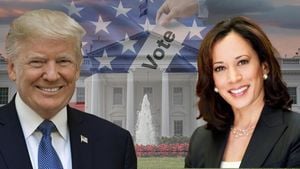The recent U.S. presidential election has sent ripples across the global stage, particularly within U.S.-China relations. With Donald Trump reclaiming the presidency, commentators are already weighing the potential repercussions for this complex and often contentious relationship. Notably, the response from Chinese President Xi Jinping was swift, as he congratulated Trump and emphasized the need for cooperation between the two powerhouses. This gesture is significant, showing recognition of the delicate balance of economic and political power both nations hold over each other.
During the lead-up to the election, Trump made it clear he was no fan of China, often branding it as one of America's biggest adversaries on various fronts, from trade and technology to human rights. After years of contentious trade policies, numerous tariffs, and reciprocal sanctions, it's no surprise Beijing responded cautiously to the recent election results. Observers noted the Chinese government maintained a facade of neutrality throughout the campaign, likely out of concern over how the electoral outcome might impact their already fragile economy.
It is important to understand how Trump's administration is expected to differ from the current strategies employed by President Joe Biden. Moody's Ratings, for example, suggests significant trade and investment changes could divert away from China, presenting opportunities for other Asian nations like India and members of the ASEAN group. These shifts may occur as the U.S. begins tightening investment restrictions on strategic sectors aimed at countering China’s influence across the Asia-Pacific region.
Predictions indicate such moves could hamper China’s already slow growth rate, largely driven by Trump's discussions of imposing tariffs on Chinese exports. UBS, for one, has estimated these tariffs could slash China’s annual growth rate significantly, exacerbated by the current pressures stemming from global supply chains rattled by the pandemic and subsequent economic downturns.
Under Trump's leadership, the trade policy is likely to pivot toward protectionism, as he pushes for tariffs, reduced imports from China, and enhancements to local manufacturing. This approach captures the broader sentiment among many U.S. politicians who see China as perpetually engaging in unfair trade practices. Such drastic policy changes will also carry significant risks, potentially disturbing the entire global economy. Moody's warned these trade policies could bring immediate consequences for U.S. industries reliant on imported goods, particularly technology and retail sectors.
Climate issues present another area likely to see stark contrasts between Biden and Trump. The rating agency forecasts Trump will likely push for policies aligning with fossil fuel production under the guise of promoting "American energy dominance," which may roll back clean energy initiatives. This turnaround may include decreased support for renewable projects and a potential withdrawal from international agreements aimed at curbing greenhouse gas emissions. The retraction from the Paris Agreement looms large, as observers speculate about the Trump administration’s commitment to previously established environmental goals.
Another dimension of U.S.-China relations post-election is the possibility of heightened tensions following Trump's assertive policies. The Chinese economy's vulnerability amid potential sanctions could lead to aggressive responses, raising fears of retaliatory measures from Beijing affecting U.S. companies operating there. This risk becomes even more pronounced as Tesla's Elon Musk, who has significant investments and operations within China, could face conflicting pressures to endorse or oppose Trump's policies.
Speculations surrounding Musk's role will undoubtedly gain traction as Trump settles back to the White House. Given the entangled relationship Musk has nurtured with China—particularly with entities around electric vehicle and battery production—how he navigates this turbulent sea of relations with the U.S. government could prove pivotal. Will Musk oppose Trump’s position on tariffs and sanctions, risking his businesses, or will he adapt his strategies to fit the new political climate?
Despite these uncertainties, one thing remains apparent: U.S.-China relations during Trump's administration will be defined not just by geopolitical maneuvers, but by economic reality. The intertwining of national interests and corporate pursuits means both nations’ leaders and business moguls must tread carefully. Moving forward, observers will be watching closely to see how engagements between Trump and his counterparts, including Xi Jinping, evolve, and to assess the potential repercussions for global trade dynamics.
Trump's upcoming presidency is already drawing both fears and hopes among various Asian nations weighing their dependence on the U.S. versus the ever-looming shadow of China. The pivot of trade policies under Trump not only affects American businesses but puts incredible pressure on countries reliant on Chinese markets, leaving them to catch the fallout of U.S. actions.
Indeed, the complexity of U.S.-China relations means no single factor will dictate the outcome. The global economic terrain is volatile, and as concerns surrounding economic stability influences diplomatic gestures, the stakes have never been higher. This new chapter casts its shadow over areas such as technology transfers, cybersecurity, and intellectual property rights—marking stages of contention and collaboration.
Trump's administration promises to revisit many agreements and agreements to amplify what he perceives as America's foundational interests. By revisiting old arguments about manufacturing jobs and tariffs, Trump aims to regain what he believes has been lost to global, and particularly, Chinese competition.
The interconnected narrative emphasizes how regional cooperation and competition will reshape economic landscapes as stakeholders begin targeting new opportunities arising from shifting U.S. policies. Whether this newfound environment aids or hinders global political dynamics remains to be seen.
Considering this backdrop, it's clear Trump's return reinforces deep-seated issues plaguing U.S.-China relations. While trade and technological rivalries ramp up, nations worldwide must brace themselves for far-reaching consequences. Both diplomatic efforts and economic policies will come under scrutiny as they attempt to balance the scales against these two titans of international relations.
The path laid out by Trump and the response from both China and other countries will set the stage for much of the upcoming decade. With every tariff and executive order, the potential for increased tensions and uncertainty looms large, creating both new challenges and opportunities for countries around the globe.
The interplay between Trump and Xi remains dynamic, and the world will be watching closely, not sure how this next chapter will shape the geopolitical narrative for years to come.



